Text
Wait, why is “The Dodo” bad?
I got quite a few questions and responses about why the online brand / website / Facebook page “The Dodo” shouldn’t be supported. Here’s a quick rundown:
Misguided Anti-Captivity. They are often blatantly anti-captivity, or use anti-captivity language and/or promote anti-captivity views. They use language such as an animal is “trapped” in a zoo or an animal was “saved” from a zoo. They actively support and often get quotes from representatives from ZooCheck, an anti-zoo and anti-captivity organization, and support HSUS (Humane Society of the United States). Their reports on tragedies of animals being injured or dying at zoos are overwhelmingly full of blame, toxicity, and disrespect. Their ideas of anti-captivity are incredibly limited and misguided – they are often pro “sanctuary” with the idea that all sanctuaries are better and they rarely discuss any kind of conservation.
Anthropomorphism over Accuracy. They are wildly, ridiculously, inaccurately anthropomorphic. For example, a picture of a bear leaned against a wall is captioned as: “He looks desperate, depressed, despondent. He stares up, seeming to search for a way out.” They described an owl resting on someone’s shoulder as “missing the man who saved her so much she couldn’t stop hugging him.” A kitten “looks at his rescuers face to be reassured everything is okay. One of their most recent articles is about a cow “shedding tears” and crying because it is sad. Overall, they are much more concerned with ‘tugging on heartstrings’ of animal lovers than with being accurate about animal behavior.
Unsafe Animal Interactions and Inappropriate Pets. Despite being anti-captivity when it comes to zoos specifically, they have often published videos of exotic pets and/or inappropriate free contact with wild/dangerous animals.
Lack of Primary Sources and Information. They often lack any resources to accurate information about their “news”. Recently they made a 45-second video which claimed that basically any elephant on display (from a Ringling Circus to a rural south Asian performance) was automatically and certainly being abused and tortured. There were no sources or proof to back this up, no resources to explore, nothing. They rarely have any kind of scientist or animal care worker as a source for any video or article, just activists.
Stealing and Editing Videos. You’ll notice almost every video on their site is made by them and hosted there, not shared from somewhere else. They take videos from other sources, add music and text, and call it their own. They almost never link to the original source.
Overall, “The Dodo” is not a news site. It’s a brand. It’s a website designed to get views and make money - it will do anything just to get those clicks. But it tries to sell itself as news, and therein lies the issue. They use strong language, buzzwords, and clickbait titles in order to push a vague, biased agenda that hurts those of us who work in zoos and other animal facilities.
Here is another strong, detailed breakdown of some of their common practices written by Why Animals Do the Thing
47K notes
·
View notes
Text
A WALK ON THE WIDER SIDE
hello and welcome to another episode of Weird Biology with me, your host Bunjy! this week’s creature is hard to see and kind of dangerous, so we’re just going to watch our step as we-
OOP WATCH OUT!
you almost stepped on him!

you should be more careful, you could have really hurt his feelings.
it’s time to meet-


*muffled hysterical laughter*
the Gaboon Viper is found in the forests and savannas of sub-Saharan Africa. its boldly patterned scales are perfectly camouflaged against the forest floor, making it all but invisible.
its incredible striking speed and strength are renowned throughout the reptile world, and its venomous bite is powerful enough to kill even a grown man! clearly, this is not a creature to be trifled with.
and it is, as they say in herpetologist circles, a Swarthy Lad.

*continued hysterical laughter*
as you may have noticed from the pictures, the Gaboon Viper is very, uh, wide. and flat. like a pancake. a pan-snake, if you will. in fact, they’re so wide that their wikipedia page has an entire measurement category called “girth” just for them. (no, I’m not joking) and it’s over 14 inches, if you were curious. that’s usually a measurement reserved for pizzas.
there’s good reason for this, because the Gaboon Viper is the heftiest viper in the world! they generally reach only 4-5 feet long, but may weigh nearly twenty pounds. that’s completely fucking ridiculous.

that’s like a normal snake, if that normal snake had just eaten a couple of 7-pound free weights.
Gaboon Vipers are at the top of the snake list for a lot of different qualities, as it turns out. it’s not just that manhole cover physique, this snake has the WHOLE package. they are known for being incredibly fast despite their size, and for wrestling prey to the ground with their sheer strength like it’s the last five seconds of a ladder match. but now get ready for a real double whammy-
they have the longest fangs of any snake! OF ANY SNAKE. they also produce the most venom per bite of any snake! OF ANY SNAKE. wow! fuck!

aaaa! I still think you’re adorable!
those fangs are two fucking inches long, for reference. two inches. let’s think about that for a minute.
oookay we’re done thinking about that. so now let’s consider the fact that a Gaboon Viper can deliver up to 7 ml of venom per bite! alright, so that doesn’t sound like a lot. but please remember that the lethal dose for a human is 0.06 ml. jesus. imagine carrying enough poison in your face to kill like a thousand people.
and for a species that mostly eats small animals like rabbits, this is absolutely stupid amounts of overkill. like, hunting-pigeons-with-a-rocket-launcher levels of overkill.

people probably would be into that if it was allowed, actually.
alright, so we’ve definitely laid out the facts that make Gaboon Vipers so terrifying. but now I’ll hit you with the good news!
human deaths from Gaboon Viper bites are very, very, very rare. and it’s because Gaboon Vipers are very good flat boys.
no seriously, some of that is because Gaboon Vipers live way the fuck out in the woods but it’s mostly because these snakes are some of the most laid-back reptiles in existence.
yes, really.

don’t have a cow, man.
Gaboon Vipers are tolerant, docile animals that are extremely unlikely to bite you. in fact, they’re so chillax that scientists have been able to pick them up barehanded and stick them in collection boxes. (WE DO NOT RECOMMEND THIS. SCIENTISTS ARE OFTEN A LITTLE NUTS.) apparently the snakes just kind of went along with it. maybe they were bored?
usually when people ARE bitten, it’s because they didn’t see the snake and fucking stepped on it. and even then, stomping on a Gaboon Viper doesn’t always earn a bite. (BUT DON’T DO THAT. IT’S MEAN.)
they’re good sweet boys, is what I’m getting at here.

the GOODEST good boy. look at his widdle face.
thankfully, the Gaboon Viper is doing pretty okay! the species is still widely distributed, and has a conservation status of Least Concern. (it probably helps that they have so little conflict with humanity! chillness is its own virtue.)
it’s not often that I close a Weird Biology article with that kind of good news, so this deserves to be celebrated! clap your hands and jump around a bit! Yaaay, Gaboon Viper! we love your chubby little face and your ridiculously chill lifestyle!
maybe we could all take a lesson from the Gaboon Viper, and relax a little more.
–
thanks for reading! you can find the rest of the Weird Biology series here.
if you enjoy my work, maybe buy me a coffee or check out my Patreon to see extra content and support Weird Biology.
–
IMAGE SOURCES
img1- Wikipedia.zh img2- The National Zoo img3- Julie Larsen Maher @WCS img4- reptiletalk.net img5- Reptiles Magazine img6- AnimalSpot.net img7- Carnivora img8- AboutAnimals.com
16K notes
·
View notes
Text
LET US PREY
guess what, it’s time for an all-new exciting episode of Weird Biology! today we’re investigating this lovely flower that I just found. it was just sitting innocently on a tree branch and it’s a lovely shade of pink, so I-
hang on, it just moved.
what the fuck. lemme just…
aaand it just stabbed me in the finger. sorry folks, turns out we aren’t dealing with a flower at all! it’s the frilly, fashionable master of disguise,

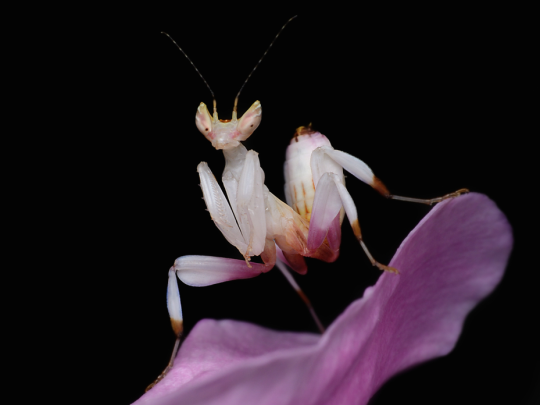
AHA! IT WAS ME ALL ALONG! STAB!
the first westerner to describe the Orchid Mantis in 1879 (a journalist from Australia) thought he was seeing a moving, carnivorous flower! obviously he was wrong, as flowers absolutely don’t do that! ha ha! (the point is, it’s an easy mistake to make. especially if you’re a journalist from 1879.)
the Orchid Mantis is a perfect flower mimic, with a dazzlingly sinister sense of fashion.

SO sinister.
the Orchid Mantis is found in the rainforests of Southeast Asia, from Malaysia to Thailand. they are small and delicate, covered with High Femme pastel frills that conceal their deadly mantid forelegs. (mostly. it’s like seeing the outline of a switchblade under a fancy skirt.)
females grow to be about 3 inches long, while males barely reach half that. they range in color from delicate pinks to lacy purples to eggshell white to that obnoxious pale yellow you only see in Easter decorations.
and except for the giant alarming eyeballs, they look exactly like, well. orchids.

THE BETTER TO SEE YOU WITH, MY DEAR.
like all praying mantids, the Orchid Mantis is a carnivore who feasts on the flesh and possibly souls of lesser insects. but with their fantastically flamboyant fashions, how are they supposed to hunt? well, the answer probably won’t surprise you!
because the Orchid Mantis looks so much like a flower, the pollinators come to it. butterflies, bees, moths, you name it. they buzz in, thinking they’ll get a mouthful of nectar and some pollen like good buggy citizens. and what does the Mantis do when these well-meaning helpful friends show up?
why, they prey.

THE BETTER TO STAB YOU WITH, MY DEAR.
also like all praying mantids, the Orchid Mantis worships the silent gods of Slice n’ Dice. when a delicious butterfly or bee bumbles too close, the Mantis promptly stabs the fuck out of it with a lightning-fast strike, and chows down.
in other words, they’re three inches of Death Metal contained under a thin veneer of tea party.
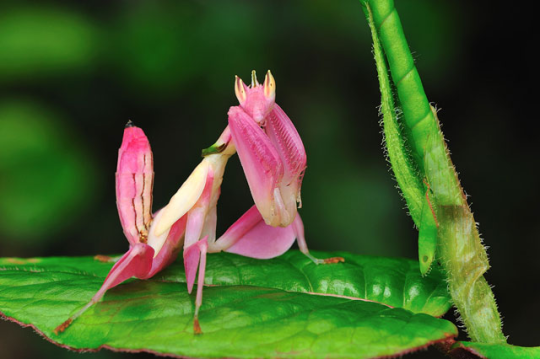
maybe a tea party where the hostess stabs you in the chest.
when they aren’t victimizing kind and helpful insects who only wanted to see a cool flower, the Orchid Mantis goes about the business of continuing the species. since adults only live about 8 months in the wild, this is more of an urgent matter than you would expect.
because Orchid Mantises are pretty rare and not studied often, we’re not actually sure how the deed is done in the wild. (I’M FINE WITH THAT.) if it’s anything like captive breeding programs, most of the dudes just get straight-up eaten. the Orchid Mantis lady is in complete and terrifying control of the situation, and often prefers a snack to the gentle embrace of a lover.
mantids are just kind of like that.
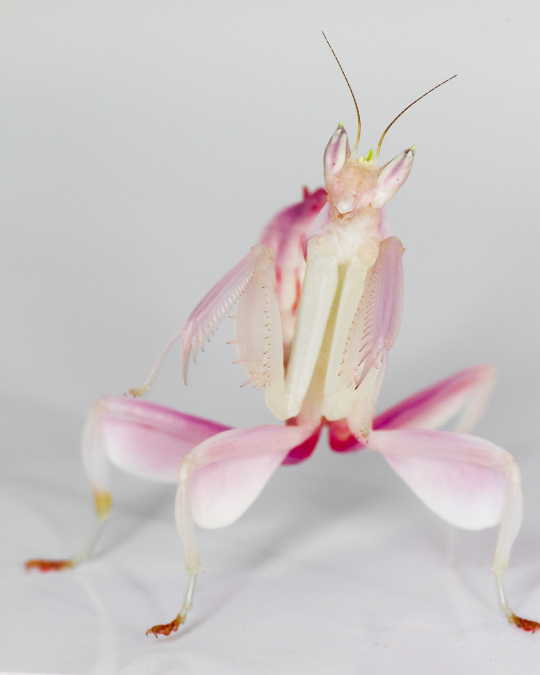
role model?
if the dude mantis is successful in his efforts, the lady mantis will then go off and lay 50-100 eggs clustered on a stem surrounded by a gross protective foam. in 5 to 6 weeks, the baby mantises will emerge and begin eating each other immediately.
(mantises are HARDCORE.)
seriously though, the babies (which look like itty-bitty adults) are red and black when they hatch. they disperse rapidly into the underbrush, at least the ones who don’t get cannibalized by a sibling. (that was real. did you think that wasn’t real?)
in a few weeks, the babies will molt and grow out of their Goth phase, emerging in the true High Femme style of their parents.
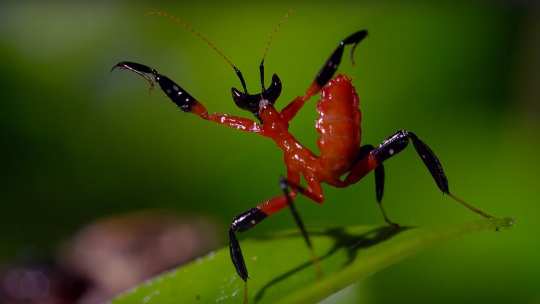
WE WILL NEVER SLEEP! ‘CAUSE SLEEP IS FOR THE WEAK!
because Orchid Mantises are so rarely seen, we’re not actually sure how they’re doing in the wild. it is believed that they are under threat from habitat destruction, as many of the rain forests they live in are plowed over. these frilly creatures need protection and support if we want them to still lurk stabbily in the wild.
however, the Orchid Mantis is extensively bred in captivity for the pet trade. it is the most popular kind of Mantis in the pet trade (for very good reasons), and its beauty and stabby nature will likely be around for a long time yet.

whether you like it or not.
–
thanks for reading! you can find the rest of the Weird Biology series here.
if you enjoy my work, maybe buy me a coffee or check out my Patreon to see extra content and support Weird Biology.
–
IMAGE SOURCES
img1- Discover Magazine img2- Science Friday img3- Wannabe Entomologist img4- featuredcreature img5- Entonation img6- NPR img7- US Mantis img8- Discover magazine
7K notes
·
View notes
Text
if you think its okay to breed dogs that can’t breathe or run or do anything like a normal dog, and you think its okay that we’re not doing everything in our power to better these breeds, please unfollow me because im done with people only giving a shit about the look of dogs. we dont need to stop breeding them, but we need to start outcrossing and giving these dogs actual nostrils and snouts they can actually use to inhale. i dont want u here. pls go.
2K notes
·
View notes
Photo
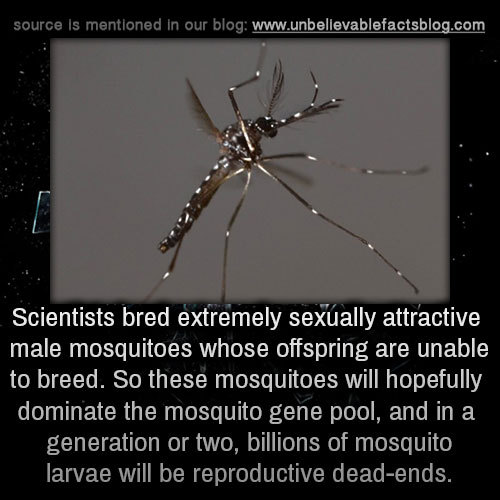
Scientists bred extremely sexually attractive male mosquitoes whose offspring are unable to breed. So these mosquitoes will hopefully dominate the mosquito gene pool, and in a generation or two, billions of mosquito larvae will be reproductive dead-ends.
230K notes
·
View notes
Text
SQUIRMING MOMMY MUNCHERS
hello everyone, and welcome to this week’s installment of Weird Biology! today, we’re going to talk about the secret basement-child of the Amphibian family. put your surprised face on and get ready to be a little uncomfortable, because it’s-


CAECILIAN, YOU’RE BREAKING MY HEART! YOU’RE SHAKING MY CONFIDENCE DAILYYY!
(i’ll stop, I’ll stop)
Caecilians (‘seh-SILL-yuns’) are a group of limbless top-secret wiggly-writhy-squirmy-wormy amphibians that live in tropical regions across the world. their name is Latin for “blind ones”, which is metal as hell but I’ll get more into that later.
there are nearly 200 species of Caecilians out there, but you’ll likely never see one in the wild because they’re so top secret. need to know only, sorry. seriously though, Caecilians are burrowers who spend their entire lives underground. in the dirt. like worms.
whiiiich they look almost exactly like.

unlike worms though, they don’t flop around on a sidewalk after a rainstorm only to get stomped on by rude children
though many Caecilians are the size and color of your regular humble dirt worms, some species can reach almost five feet long! BIG WORM.
(sorry.)
seriously though, there’s a lot of variation between Caecilian species. some are worm-tiny, some are the size of garter snakes, some look like someone dropped a rogue intestine and it wandered off.

sir, you forgot your, uhhhhhh…
they also come in a riot of colors and patterns, from pink to violent yellow stripes to blue! this is actually kind of weird, because most Caecilians don’t actually have eyeballs to see them with. (some have simple recessed eyes, but these only have simple vision that can tell light from dark)
while there’s a lot of very strange variations going on in the Caecilian household, they all share the same basic body plan. ( “worm, but a vertebrate?????” ) their long skinny body helps them to squirm around in the dirt!
and it is all body, as most Caecilians have short or entirely absent tails.
yup. that’s all torso, baby.

yes, there’s a butt on the end. stop asking.
Caecilians may look like worms at first, but you only have to see one grab a frog and swallow it headfirst once to realize that holy shit, what is that.
that’s right, Caecilians are voracious and effective predators! they may not look like much of a threat to you, but the very thought of these wiggly squirmlings gives every creature that lives underground screaming nightmares. the Caecilian, equipped with small but incredibly strong jaws lined with dozens of tiny needle teeth, thinks this is just fine.

jesus, this picture makes me want to end the article early and just go home.
the Caecilian uses its sense of smell and the small sensory tentacles (yes, tentacles. who designed these, Lovecraft?) on their face to locate prey, which is anything smaller than them. they eat toads, frogs, moles, actual real dirt worms, and a whole smorgasbord of underground bugs. all of which are swallowed whole.
but the Caecilian doesn’t worry too much about meeting a similar fate itself, (possibly at the metaphorical hands of a very large Early Bird) as many of them have toxic skin!
like a dart frog.

these guys really have all their goddam bases covered, huh?
another fun fact about Caecilians is that they eat their own mothers! (but only a little bit.)
Caecilians all reproduce using internal fertilization, and many of them bear live young. like some kind of filthy mammal, or something. but since amphibians don’t produce milk, this raises the question: how is babby fed?
well, the answer is pretty disturbing, so you small children in the audience should make sure to listen EXTRA CLOSE so that you can totally gross out your friends during recess.
they eat their mom’s skin.

awwwwww.
no seriously, the Caecilian mom feeds her children by producing an extra layer of fatty and highly-nutritious skin that replaces itself every three days on the clock. which is good, because that’s exactly how long her sweet little Caecilian children take to nibble it off with their many sharp teeth.
the babies will stay with mom until they’re big enough to make it on their own, at which point they kick they skin-eating habits and skeedaddle.
this way of life may disgust you, but you gotta admit it definitely works. while some Caecilians are in danger of extinction, many of them are doing pretty okay.
that said, I don’t recommend that you go home and nibble on Mom. some things are best left to the worms.

we look like worms! but we are not! we eat skin and we think that’s great! CAECILIANS!!
–
thanks for reading! you can find the rest of the Weird Biology series here.
if you enjoy my work, maybe buy me a coffee or check out my Patreon to see extra content and support Weird Biology.
–
IMAGE SOURCES
img1- ThoughtCo img2- Wired img3- Joel Sartore img4- calphotos img5- featuredcreature img6- Science News for Students img7- Nature img8- oneplusnews
9K notes
·
View notes
Text
SATAN’S BALLOON ANIMALS
guess what, it’s time for another episode of Weird Biology! today we’re going to learn about a creature that looks like a stained-glass window, but stalks the oceans with toxic might powered only by the wind like a sailing ship of old.
that’s right, it’s the devil’s own shopping bag-



the name is almost longer than the animal.
The Portuguese Man o’ War is a floating jellyfish relative called a Hydrozoan. it was named after the 18th century sailing ship, apparently by a blind person. “oh, it looks like a sailing ship under full sail” no it doesn’t, shut up. it looks like a rogue walmart shopping bag that blew into the Atlantic and makes a living by strangling innocent sea turtles.
but like the aforementioned plastic bag, the Man o’ War uses its lovely blue-purple air sac to catch the breeze. it wanders in groups through the warm waters of the Atlantic, driven along by the wind and tides. kind of poetic, really.
as long as you don’t look underwater, anyway.
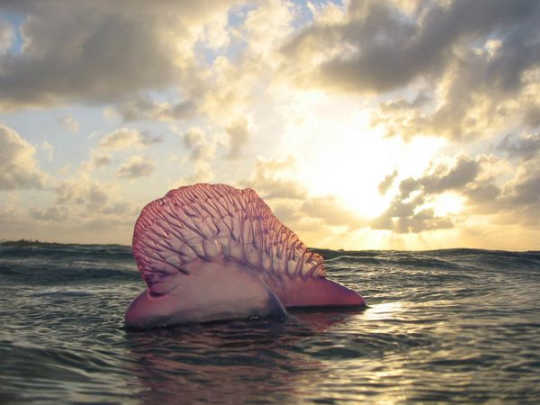
I’m about to ruin it for everybody, hang on.
like so many other things in life, it’s not what you see on the surface that’s important but what is underneath that counts.
in this case, what’s underneath is up to 165 feet of venomous tentacles. it’s like that thing they say about icebergs, where you only see the top 10% and the rest is an invisible ship-killing nightmare? it’s exactly like that.
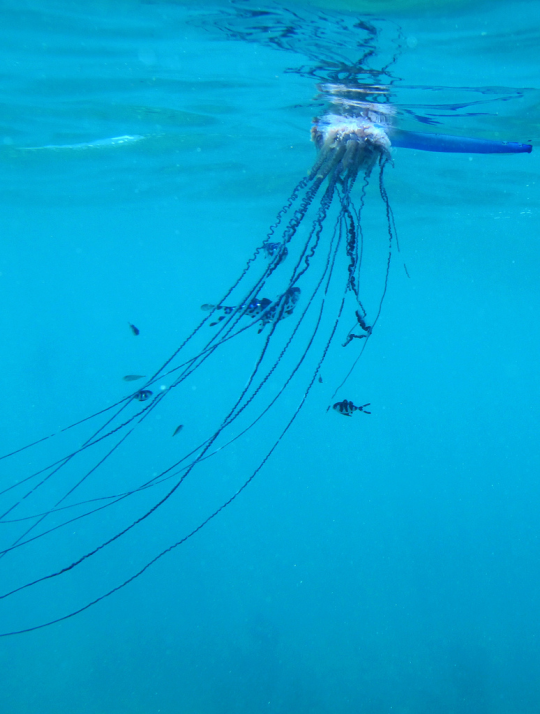
except with poison tentacles.
the Man o’ War is basically a biological fishing trawler, trailing these stupidly long tentacles like a fine mesh net through the water. and when an innocent fish who probably has a family at home comes into contact with this “net”, specialized cells called Nematocysts are triggered to fire tiny poison harpoons into the victim, causing instant death or paralysis.
the tentacle then reels itself upward into the body of the Man o’ War like a fishing line, dragging its helpless victim upward to be digested.
so, uh, actually not like a fishing trawler then, not like a fishing trawler at all.
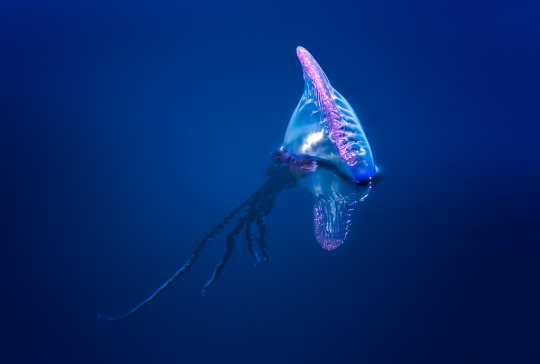
unless the fishing trawler was designed by Junji Ito.
though the Man o’ War may look like a jellyfish, it’s definitely not. in fact, it’s not even a single animal! it’s actually four separate organisms jammed into a venomous trenchcoat like three best friends trying to sneak into an R rated movie.
“how the fuck even”, I hear you say. and that’s a valid question! it’s not everyday that we discover that what we thought was a single animal is actually four smaller animals living communally to form a larger, more dangerous animal. it would be like discovering that opossums are actually comprised of 17 rats each.
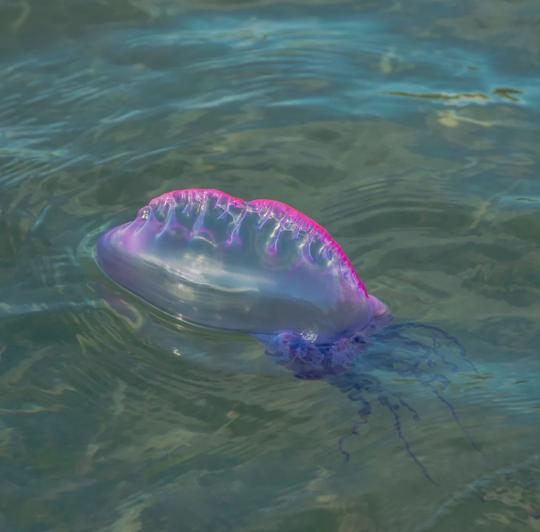
no word on if they do a silly dance and tap their fingers together to fuse or what though.
in the Man o’ War’s case, these four individual kinds of “polyps” that comprise the complete final form are the air sac polyp (gets the gang around), the digestive polyp (converts murdered fish into energy for the whole gang), the reproductive polyp (makes small clones of each individual gang member), and the tentacle polyp (murders things indiscriminately for the sheer joy of it).
that’s right, the tentacles are a separate animal! you might be wondering if they sometimes come loose, wander off, and just sting people/animals randomly when they drift into populated areas. what a silly question!
yeah, happens all the time.
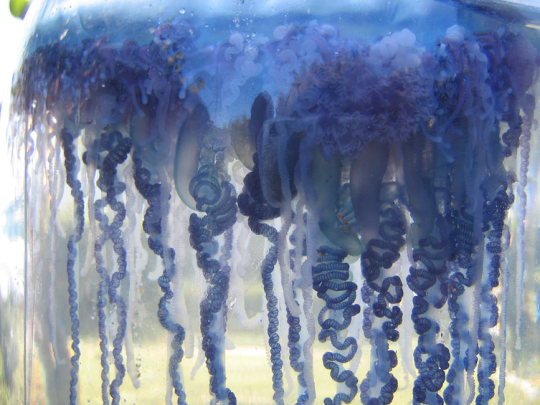
SHIT.
while rarely fatal, Man o’ Wars stings can seriously injure humans. this is a big problem in areas where Man o’ Wars are common, because storms and predators can knock the tentacles right the fuck off. the tentacles drift away, only to wash ashore and sting a hapless beachgoer weeks later. that’s right, rogue tentacles can still sting for days or weeks after separation! even if the Man ‘o War is beached! isn’t that neat! fuck!
the discovery of a beached Man o’ War usually closes the entire fucking beach, for this reason. would YOU want to go fuck around in the sand if it might be full of over a hundred feet of poison spaghetti too fine to notice with the naked eye?
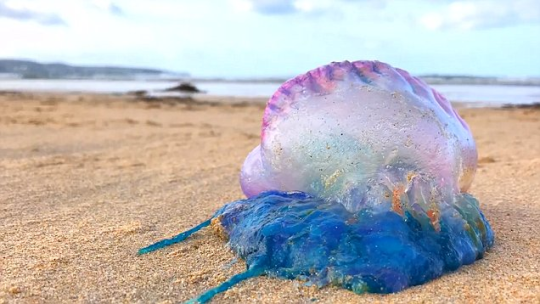
if the answer is yes, I have great news about a bridge I’d like to sell you.
if all this information upset you, I’d like to offer my deepest condolences. but buckle up for one last upsetting fact, and here it is: Man o’ War are spreading.
usually restricted to warm waters, climate change has driven the Man o’ War as far north as Great Britain. that’s awful awful awful news for any country that touches the Atlantic ocean, which is lots of them.
luckily, we have dependable allies in this fight: sea turtles and the Mola Mola! (which I’ve written about before) unfortunately just about all we can do at this point is to cheer these awesome devil-balloon-munchers on from the safety of shore, while trying to invent a Man o’ War-proof barrier net.
for now, watch out for anything that looks like a floating plastic bag.
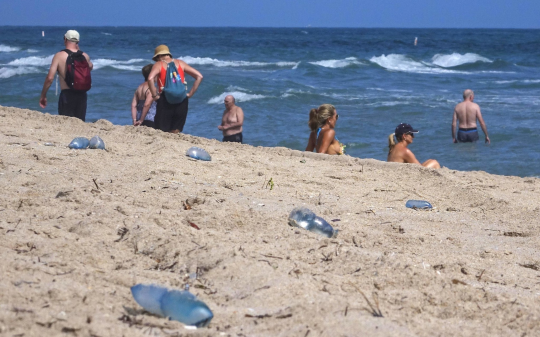
and for god’s sake, watch where you step.
–
thanks for reading! you can find the rest of the Weird Biology series here.
if you enjoy my work, maybe buy me a coffee or check out my Patreon to see extra content and support Weird Biology.
–
IMAGE SOURCES
img1- National Geographic img2- The Garden of Eadon img3- Sean Nash img4- Enrico Villa img5- livescience.com img6- diply.com img7- Daily Mail img8- Sun Sentinel
48K notes
·
View notes
Text
Adorable puppy arrives; has 5x more energy than owners
So we got the puppy! He’s precious, his name is Tanner. He weighed 3.7lb. at the vet’s on Tuesday and was pronounced a perfectly healthy 9-week-old puppy.
I will post pics as soon as I can (a) get pictures that aren’t blurry, and (b) get a few minutes to myself.
1 note
·
View note
Text
@colddbloods
Have you ever met ponies tho?
horses are not scheming animals
256 notes
·
View notes
Text
I believe dwarf crayfish (e.g. CPO) are considered small enough for a 10-gallon?
African dwarf frogs are evidently great fun, so are shrimp.
And of course another betta would love it!
goldfish in a 10gal?
so i recently got my first fish, a betta in a 5.5 gallon tank
but now im thinking about getting my boyfriend a 10 gallon with a goldfish
but i read something online that said you cant have a goldfish in less than a 20 while my friend who has multiple goldfish in a 30 hasnt had a problem
help?
325 notes
·
View notes
Note
Not to mention goldfish grow to 12″ or so and will easily be able to eat the betta...
They’re actually about the least compatible fish in existence.
Hello, I plan on buying a bigger tank that has a filter so I don't have to clean two tanks but I am not sure my male betta would like to be with my 4 goldfish and was wondering if he/they would be fine with each other?
Betta and goldfish are not compatible with each other, as they’re both aggressive species and have different needs in their tanks (i.e. Betta live in warm waters, goldfish live in cold temps). A single goldfish needs minimum 20-30gallons of water with open space, while a betta needs to have lots of space that is filled with live/soft artificial plants.
There are more factors that differentiates them, but these are the first ones that come to mind.
To summarize: don’t put them together! They will most definitely fight, and the results are fatal. I hope this helps, and if ya got more questions, lemme know ❤️
9 notes
·
View notes
Photo

I’m rescuing this snake this weekend.
I don’t know if I’m excited about it? It wasn’t planned, but I was window shopping on Craigslist (my first mistake) and couldn’t walk away from what was obviously a bad situation for it. I think you should do as much good as you can, and rescuing ball pythons seems to be a good I can do.
It’s a spider morph (not sure if also pastel) so it’ll have neurological issues for its whole life, on top of whatever problems it comes with from its current home. It doesn’t live in that little box of dirt- thankfully, although I dont know why that’s where he keeps photographing it- but its actual enclosure isn’t that much better in terms of species-appropriate care. I’m picking it up on Saturday and going to the vet pretty much immediately afterward to get the critter checked out.
64 notes
·
View notes
Text
dark bee tumblr show me the forbidden bees
115K notes
·
View notes
Note
One of my favorite breeds!
I would love to start my own outcross project someday.
Dalmatians if you could! but before that, your favorite time period of art! (-:
Art is interesting and beautiful but I can’t claim to know much about it.
Please note the disclaimer.These posts are about the breed from a veterinary viewpointas seen in clinical practice, i.e. the problems we are faced with.It’s not the be-all and end-all of the breed and is not to make ajudgement about whether the breed is right for you. If you are askingfor an opinion about these animals in a veterinary setting, that iswhat you will get. It’s not going to be all sunshine and cupcakes,and is not intended as a personal insult against your favorite breed.This is general advice for what is common, often with a scientificconsensus but sometimes based on personal experiences, and is not aguarantee of what your animal is going to encounter in their life.

Dalmatians get a bad wrap in some circles. They’re pretty dogs, and they suffered a popularity surge after the 101 Dalmatians movie, resulting in a lot of people suddenly getting dalmatians, and these dogs being less selectively bred. My first boss used to say they “have more spots than brain cells”.
Deafness might be to blame for the perceived lack of intelligence. A dog that is deaf, or partially deaf, is harder to train and may be less aware of signals in its surroundings. Deafness in this breed is genetic and probably linked to their coat color.
Urate bladder stones are a major issue and point of controversy in the Dalmatian breed. The entire breed lacked the gene to properly metabolise uric acid, resulting in it accumulating in joints (gout) or as crystals and stones in the urine. The Dalmatian-Pointer Backcross Projectaimed aimed to introduce a single gene to correct this defect into the Dalmatian population. And it worked! After 5 generations, the resulting dogs, crossed back to pure dalmatians, looked and acted exactly like ‘pure’ dalmatians, minus the health defect. Only the dalmatian breeder’s community kicked up such a huge stink about these dogs not being ‘pure’ that they either couldn’t be registered as pure dalmatians, or were registered with a long list of restrictions.
Demodex mange was reported to be more common in these dogs, however with increasing numbers of over-the-counter products that just happen to treat demodex, this may become less common over time.
Glaucoma, cataracts and micropthalmia (malformed eyes) all occur with increased frequency in this breed.
Hypothyroidism is also reported to be more common in dalmatians once they reach middle age, but it’s relatively easy to manage.
It’s also worth mentioning that congenital eye problems and congenital deafness might be less frequent in dogs which have more colour around their ears and eyes. This is because abnormal melanocytes (pigment cells) within the ear and eyes are associated with these conditions. However, most breed clubs recommend against breeding dogs with solid eyes and ears to preserve the classic spotted coat.
214 notes
·
View notes
Text
This is how I wound up with two of my tanks...
owning aquatic animals is a slippery slope bc once you get one and learn about the care they ACTUALLY need you just want to save them all and give them the love they deserve
431 notes
·
View notes
Note
Sometimes it helps me to feed it first. That’s such a little task, it’s fun, and it reminds you, “hey, food going in, poop going out, NITRATES NITRATES NITRATES water change needed.”
Please help. I'm 2 days overdue on water changes but I'm having executive dysfunction and cannot force myself to do the thing. Do you have any tips for pushing through this?
I try to tell myself that I have to do it for the fish, and it’s my responsibility. I also set a deadline, like I tell myself I HAVE to do it Tuesday OR ELSE. I try to mentally hype myself up that bad things will happen if I don’t meet that deadline and that usually gets me to do it
186 notes
·
View notes
